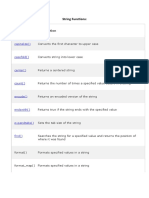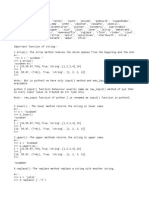Built in String Methods Python
Uploaded by
Vedansh SinghBuilt in String Methods Python
Uploaded by
Vedansh SinghBuilt-in String Methods in Python
capitalize() - Converts the first character to uppercase.
casefold() - Converts the string to lowercase, more aggressive than lower().
center(width[, fillchar]) - Centers the string, padding it with specified character.
count(sub[, start[, end]]) - Returns the number of non-overlapping occurrences of a substring.
encode(encoding='utf-8', errors='strict') - Encodes the string using the specified encoding.
endswith(suffix[, start[, end]]) - Checks if the string ends with the specified suffix.
expandtabs(tabsize=8) - Replaces tabs with spaces, using the specified tabsize.
find(sub[, start[, end]]) - Returns the lowest index of the substring, or -1 if not found.
format(*args, **kwargs) - Performs string formatting.
format_map(mapping) - Formats the string using a dictionary mapping.
index(sub[, start[, end]]) - Returns the lowest index of the substring, raises ValueError if not found.
isalnum() - Checks if all characters are alphanumeric.
isalpha() - Checks if all characters are alphabetic.
isascii() - Checks if all characters are ASCII characters.
isdecimal() - Checks if all characters are decimals.
isdigit() - Checks if all characters are digits.
isidentifier() - Checks if the string is a valid Python identifier.
islower() - Checks if all characters are lowercase.
isnumeric() - Checks if all characters are numeric.
isprintable() - Checks if all characters are printable.
isspace() - Checks if all characters are whitespace.
istitle() - Checks if the string follows title case rules.
isupper() - Checks if all characters are uppercase.
join(iterable) - Joins elements of an iterable with the string as a separator.
ljust(width[, fillchar]) - Left-justifies the string, padding it with specified character.
lower() - Converts all characters to lowercase.
lstrip([chars]) - Removes leading characters (default is whitespace).
maketrans(x[, y[, z]]) - Creates a translation table for use with translate().
partition(sep) - Splits the string into a 3-tuple around the first occurrence of sep.
replace(old, new[, count]) - Replaces occurrences of a substring with another substring.
rfind(sub[, start[, end]]) - Returns the highest index of the substring, or -1 if not found.
rindex(sub[, start[, end]]) - Returns the highest index of the substring, raises ValueError if not found.
rjust(width[, fillchar]) - Right-justifies the string, padding it with specified character.
rpartition(sep) - Splits the string into a 3-tuple around the last occurrence of sep.
rsplit(sep=None, maxsplit=-1) - Splits the string from the right, optionally limiting the splits.
rstrip([chars]) - Removes trailing characters (default is whitespace).
split(sep=None, maxsplit=-1) - Splits the string into a list using the specified separator.
splitlines([keepends]) - Splits the string at line breaks.
startswith(prefix[, start[, end]]) - Checks if the string starts with the specified prefix.
strip([chars]) - Removes leading and trailing characters (default is whitespace).
swapcase() - Swaps the case of all characters.
title() - Converts the string to title case.
translate(table) - Translates the string using a translation table.
upper() - Converts all characters to uppercase.
zfill(width) - Pads the string with zeros on the left to reach the specified width.
You might also like
- Compound Datatype Operators and FunctionsNo ratings yetCompound Datatype Operators and Functions7 pages
- Learn Python 3 Strings: Escaping Characters in A StringNo ratings yetLearn Python 3 Strings: Escaping Characters in A String8 pages
- Q4 2023 PitchBook Analyst Note Time For Real TimeNo ratings yetQ4 2023 PitchBook Analyst Note Time For Real Time27 pages
- Cryptography, Winter Term 16/17: Sample Solution To Assignment 5No ratings yetCryptography, Winter Term 16/17: Sample Solution To Assignment 53 pages
- PDF Commercializing Childhood Children s Magazines Urban Gentility and the Ideal of the Child Consumer in the United States 1823 1918 1st Edition Paul B Ringel download100% (2)PDF Commercializing Childhood Children s Magazines Urban Gentility and the Ideal of the Child Consumer in the United States 1823 1918 1st Edition Paul B Ringel download40 pages
- Minimum Requirements - Third Party Equipment - Float Equipment - 04 - 6579316 - 04No ratings yetMinimum Requirements - Third Party Equipment - Float Equipment - 04 - 6579316 - 041 page
- 100 Useful Tips and Tools To Research The Deep Web100% (1)100 Useful Tips and Tools To Research The Deep Web5 pages
- Lesson Plan SP Grade 7 SS Geography T1 W1No ratings yetLesson Plan SP Grade 7 SS Geography T1 W15 pages
- Swain King 2022 Using Informal Conversations in Qualitative ResearchNo ratings yetSwain King 2022 Using Informal Conversations in Qualitative Research10 pages
- Bugle Single 45 Amplifier - Complete SetNo ratings yetBugle Single 45 Amplifier - Complete Set3 pages
- Book Review - Cradle To Cradle (Environmental Issues)No ratings yetBook Review - Cradle To Cradle (Environmental Issues)4 pages

























































































